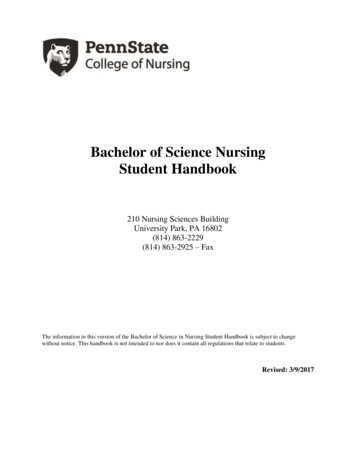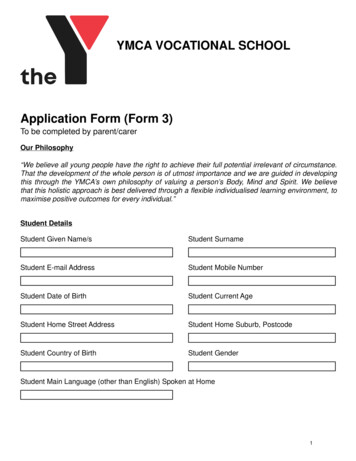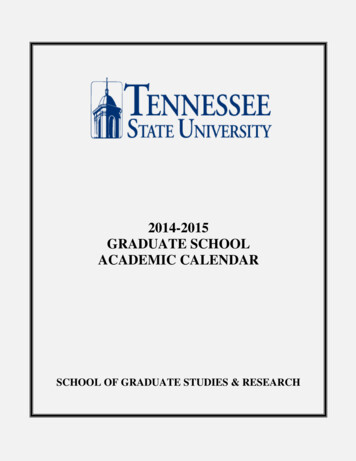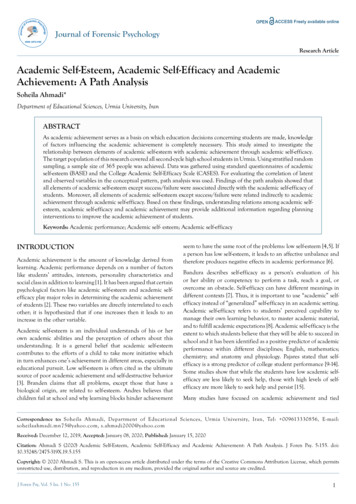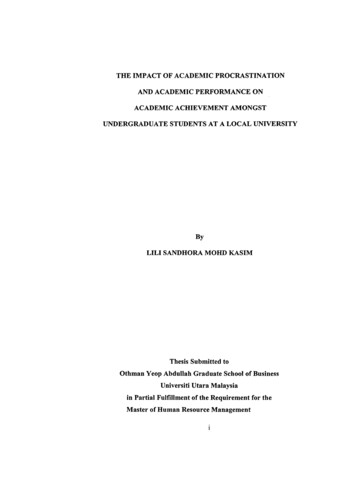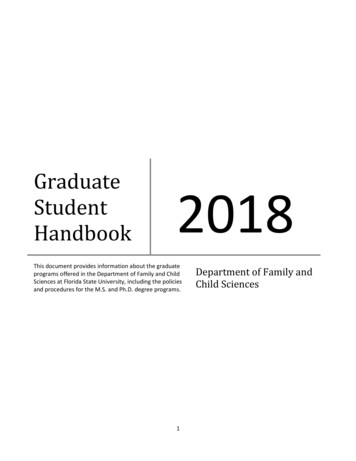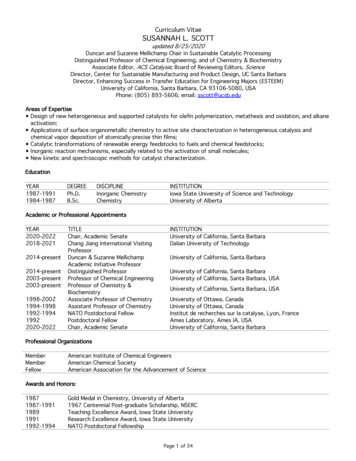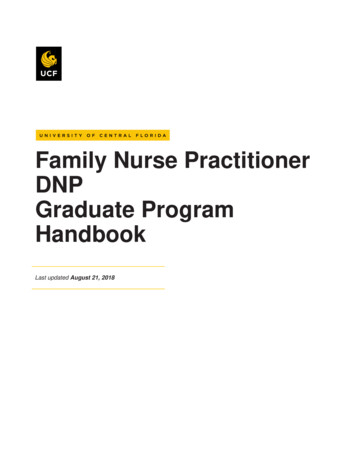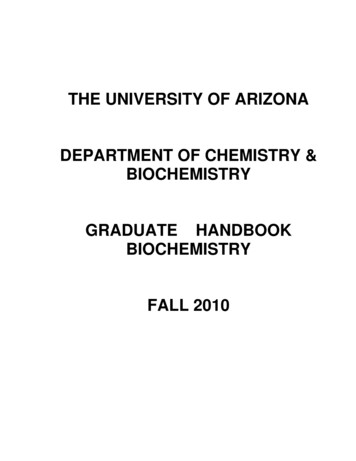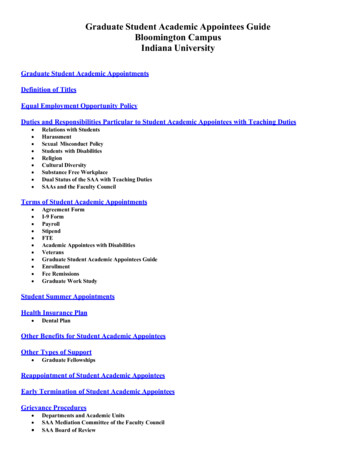
Transcription
Graduate Student Academic Appointees GuideBloomington CampusIndiana UniversityGraduate Student Academic AppointmentsDefinition of TitlesEqual Employment Opportunity PolicyDuties and Responsibilities Particular to Student Academic Appointees with Teaching Duties Relations with StudentsHarassmentSexual Misconduct PolicyStudents with DisabilitiesReligionCultural DiversitySubstance Free WorkplaceDual Status of the SAA with Teaching DutiesSAAs and the Faculty CouncilTerms of Student Academic Appointments Agreement FormI-9 FormPayrollStipendFTEAcademic Appointees with DisabilitiesVeteransGraduate Student Academic Appointees GuideEnrollmentFee RemissionsGraduate Work StudyStudent Summer AppointmentsHealth Insurance Plan Dental PlanOther Benefits for Student Academic AppointeesOther Types of Support Graduate FellowshipsReappointment of Student Academic AppointeesEarly Termination of Student Academic AppointeesGrievance Procedures Departments and Academic UnitsSAA Mediation Committee of the Faculty CouncilSAA Board of Review
Graduate Student Academic AppointmentsAssociate Instructor, Graduate Assistant, Research Assistant, Faculty AssistantGraduate student appointments are offered by academic schools or departments to selected graduate students.The stipends attached to appointments are considered graduate student support and compensation for theacademic duties assigned, and as such are considered to be taxable income. These student academicappointments are independent of other possible awards of financial aid.Definition of TitlesAssociate Instructor—A graduate student who is employed as a teacher and engages in activity as a teacher,providing the employee has responsibility for assigning grades for at least a portion of a course and has directcontact with students.Graduate Assistant—A graduate student who, in an academic department or in an administrative office, assistsin work associated with the duties of faculty members or administrators, such as library searches, curriculardevelopment, or paper grading, and who is not an Associate Instructor, Research Assistant, or Faculty Assistant.Research Assistant—A graduate student who is engaged in or assists with original, professional-level research.Faculty Assistant—A graduate student who holds an academic appointment, and performs non-teachingservices in an instructional program, where the services are equivalent in importance to those performed byAssociate Instructors.Equal Employment Opportunity PolicyIndiana University pledges itself to continue its commitment to the achievement of equal opportunity within theUniversity and throughout American society as a whole. In this regard, Indiana University will recruit, hire,promote, educate, and provide services to persons based upon their individual qualifications. Indiana Universityprohibits discrimination based on arbitrary considerations of such characteristics as age, color, disability,ethnicity, gender identity, marital status, national origin, race, religion, sex, sexual orientation, or veteran status.Indiana University shall take affirmative action, positive and extraordinary, to overcome the discriminatoryeffects of traditional policies and procedures with regard to the disabled, minorities, women, and veterans.Duties and Responsibilities Particular to Student Academic Appointees with TeachingDutiesTeaching consists of the activities of lecturing, tutoring, instructing, laboratory assisting in an instructional role,and the like in the activity of imparting knowledge.Student Academic Appointees who teach have many of the same professional duties as faculty. This isparticularly true of the responsibilities they have towards their students, from whose perspective both theStudent Academic Appointee and the faculty are teachers. For this reason, the faculty "Code of AcademicEthics" mic-ethics/index.html applies in large part to StudentAcademic Appointees (SAA) who teach. Faculty and SAAs who teach are, above all, obligatedto adhere to the stated goals and purposes of a course and to teach it at the scheduled time. Anyexceptions must be approved in advance by the department chairperson or the SAA’s supervisor.Relations with StudentsIf faculty members (including graduate students with teaching responsibilities) engage in amorous or sexualrelations with students for whom they have professional responsibility, even when both have consented to therelationship, it will be viewed as a violation of the “Code of Academic Ethics.”HarassmentIndiana University does not tolerate harassment that targets an individual based upon race, color, religion,national origin, ethnicity, sex, gender identity, age, sexual orientation, disability, veteran status or maritalstatus. Students who believe they have been harassed are encouraged to report such incidents to one of thefollowing2
offices: the dean, department chair or supervisor, Office of Affirmative Action, Office of the Vice Provost forFaculty and Academic Affairs, or the Dean of Students.Sexual Misconduct PolicyIndiana University prohibits discrimination on the basis of sex or gender in its educational programs andactivities. Discrimination on the basis of sex or gender is also prohibited by federal law, including Title VII andTitle IX. This prohibition includes sexual harassment, sexual violence, dating violence, domestic violence,sexual exploitation, and stalking (collectively referred to as “Sexual Misconduct”). The University promptlyresponds to all reports of sexual misconduct involving University employees and/or students and provides a fairand impartial investigation and resolution for complaints. Student academic appointees are strongly encouragedto read the University Sexual Misconduct Policy for all definitions and ndex.html).All student academic appointees, including Associate Instructors, are considered “Responsible Employees”under the University’s Sexual Misconduct policy, and have an obligation to report any information they becomeaware of regarding incidents of sexual misconduct. As a Responsible Employee, student academic appointeesare required to take annual sexual misconduct training provided by the University. Reports of sexualmisconduct should be made to one of the Deputy Title IX Coordinator for the IU Bloomington campus, or theUniversity Title IX Coordinator, each identified below. For more information on the role of ResponsibleEmployees training and how to assist students, please dex.html You may also contact any of the individuals below formore information or assistance.Title IX Deputy CoordinatorsUniversity Title IX CoordinatorLibby Spotts, Director/Deputy Sexual Misconduct & TitleIX Coordinator, 812-855-5419 (Student Conduct receivesand responds to all reports alleging sexual misconduct by astudent.)Samantha Hammett, Assistant Director of Sexual ViolencePrevention & Victim Advocacy, 812-855-9381Jennifer Kincaid, Title IX Officer,812-855-4889In an emergency or where immediate help is needed, call 911.For more information on the University’s procedures and available resources, see the Stop Sexual Violencewebsite (https://stopsexualviolence.iu.edu). The Sexual Assault Crisis Service (SACS) line is also available 24hours a day for immediate assistance for those experiencing sexual assault and other forms of sexual violence(812-855-8900).Students with DisabilitiesThe University provides reasonable accommodation and services which facilitate the higher education ofqualified students with temporary or permanent disabilities. The extent to which these services are supplied isbased on individual student’s need and academic requirements. Students requesting assistance regarding adisability should contact the Office of Disability Services for Students.3
ReligionIndiana University respects the right of all students to observe their religious holidays and will make reasonableaccommodation, upon request, for such services. A list of dates for major religious holidays will be includedeach semester in the Schedule of Classes. Students wanting accommodations will contact their instructors.Cultural DiversityThe Bloomington Faculty Council has recommended the Vice Provost for Faculty and Academic Affairs ensureimplementation of programs directed toward all new SAAs with teaching responsibilities which addressstandards of conduct—including those behaviors related to cultural diversity which include racial, ethnic, sexualorientation, sex, and gender identity discrimination. Therefore, each new SAA with teaching responsibilities isexpected to attend the Cultural Diversity Issues Workshop during the Fall or Spring semester of the first year ofacademic appointment. Each SAA who teaches will be assigned to one of the scheduled workshops by his/herdepartment. The purpose of the workshop is twofold:1. To assist SAAs who teach in developing effective strategies for addressing issues related to all of theaforementioned cultural diversity issues in the classroom.2. To review the enforcement procedures associated with the “Code of Academic Ethics”, and theconsequences for violation.Substance Free WorkplaceThe Drug Free Workplace Act of 1988 and the federal Drug Free Schools and Campuses Act of 1990, prohibitsthe unlawful possession, use, distribution, manufacture or dispensing of illicit drugs and alcohol, includingcontrolled substances, on Indiana University’s premises, or while conducting university business off universitypremises. In addition to possible penalties under federal and state law, failure to comply with this policy mayresult in any of the following sanctions:1. Reprimand, suspension, or termination2. Required completion of substance abuse treatment or substance abuse education programIn addition, an employee must notify his/her dean or chair of his/her conviction for violations occurring on oroff university premises while conducting university business. This must be done within 5 calendar days after theconviction.The abuse of alcohol and other drugs increases the risk for a number of health related problems. In addition,alcohol and drug abuse can contribute to a number of social, behavioral and academic work performanceproblems. Indiana University encourages individuals with alcohol or other drug related problems to seekassistance through their health care provider or the Employee Assistance Program at 1-888-881-LINC (5462).Dual Status of the SAA with Teaching DutiesAn SAA who teaches is a student as well as a member of the teaching staff. In many situations, this distinctionis clear and unambiguous, but at times it results in ambiguities and potential problems. As a graduate student,the SAA is subject to the “Code of Student Rights, Responsibilities, & Conduct” (available online at:https://studentcode.iu.edu/) and holds full student status, including the right to vote for and hold office inStudent Government. On the other hand, as a member of the teaching staff, the SAA who teaches hasresponsibilities in many ways identical with those of the faculty. Normally, however, SAAs teach under thesupervision of one or more members of the faculty who have the responsibility for the course.SAAs and the Faculty CouncilThe Student Academic Appointee Affairs Committee is a standing committee of the Council; it reviewspolicies, recommends changes and new policies, conducts elections, and disseminates information about thestatus of SAAs (see also Grievance Procedures below).4
The Bloomington Faculty Council has specified that SAAs shall: 1) be employed under a written agreement, 2)be provided a link to the Graduate Student Academic Appointees Guide, 3) be provided (by the supervisoryfaculty or departmental chairperson) a written set of guidelines detailing the teaching objectives andadministrative responsibilities established by the supervisor for the course in which the SAA is to teach, 4) beterminated in mid-appointment only by the procedure specified by the Faculty Council (see Early Terminationof Student Academic Appointees), and 5) be paid the established minimum stipend as defined by the FTE (seeTerms of Student Academic Appointments#Stipend).Terms of Student Academic AppointmentsAgreement FormEvery student academic appointee is appointed under the SAA Agreement form which is hiring/hiring-guidelines/index.html. This application, signed by boththe student academic appointee and the department chairperson or dean of a professional school, constitutesthe appointment agreement, one copy of which is to be returned to the appointee.I-9 FormFederal regulations now require that an I-9 form (Employment Eligibility Verification) be completed on all newappointees PRIOR TO THEIR STARTING WORK. Part I of the form is to be completed by the new appointee,attesting to her/his eligibility for employment in the United States. Part II is to be completed by a representativeof Indiana University attesting that original documents as specified on the I-9 which verify the employee'sidentity and employment eligibility have been viewed. If on limited status, appointment may not exceed theauthorized expiration date.PayrollAll student academic appointees are paid on the monthly, academic year, or summer sessions payrolls, not onthe bi-weekly payrolls. Where a student's work is directly tied to an academic year or summer session program(usually the case for SAAs with teaching responsibilities), appointment is based on a semester, academic year,or summer session. Students involved in projects or work not tied to the academic year are appointed on amonthly basis with fixed starting and ending dates. All students will be required to utilize direct deposit forpayroll.StipendDepending on the percentage of full-time equivalent (FTE) to which a student is appointed, the followingstipend minima shall be applied for ten-month appointments:2022-2023FTEContact HoursMinimum50%20 18,00045%18 16,20040%16 14,40037.5%15 13,5005
Actual stipends often take the following factors into account: 1) responsibilities assigned, 2) personalqualifications and previous experience, 3) educational level of appointee, and 4) years of experience as a studentappointee.FTEStudent academic appointees must be appointed at a minimum of 37.5% FTE (15 standard hours per week). A50% FTE (20 standard hours per week) appointment is considered full time. This applies to any supplementalpayments and additional academic appointments. Appointments above 50% FTE up to 75% FTE will requireprior approval by the Vice Provost for Faculty and Academic Affairs Office. Justification for the appointment inexcess of 50% FTE must be accompanied by a statement from the graduate student's major faculty advisorendorsing the exception.Academic Appointees with DisabilitiesAcademic appointees who wish to request an accommodation for a disability should contact the Office of theVice Provost for Faculty and Academic Affairs.VeteransThe University provides services to students who are veterans. Students should contact the Office of VeteransSupport Services for assistance.Persons "who are members of the Indiana National Guard or of the reserve components or the retired personnelof the naval, air, or ground forces, shall be entitled to leave of absence from their respective duties, without lossof time or pay for such time as the members of the National Guard are in the military service on training dutiesof the state of Indiana under the order of the governor as commander-in-chief, or as members of any reservecomponent under the orders of the component authority thereof, for periods not to exceed fifteen days in anyone calendar year."Graduate Student Academic Appointees GuideEvery student on a graduate student academic appointment must be informed by their department that the guidefor Student Academic Appointees is available online at: demicappointees-guide.pdfEnrollmentStudent academic appointees must be degree candidates and are expected to be enrolled each semester onappointment. Compliance with enrollment requirements for graduate students on academic appointment ismonitored against the Registrar's official records.a) All graduate students on academic appointment at or above 37.5% FTE (15 hours of duties per week)must enroll in 6 credit hours each semester on appointment (summers excluded).b) All doctoral candidates who have accumulated 90 graduate credit hours and master of fine artsstudents who have completed 60 graduate credit hours and who have completed all course requirementsfor the degree except the dissertation or final project or performance, if applicable, may enroll in G901,Dissertation Research, which carries a value of 6 credit hours. (A student may enroll in G901 no morethan 6 times.)Fee RemissionsProcedures for Departmental Fee Remission Awards are issued yearly by the Office of the Vice President andChief Financial Office after consultation with the Vice Provost for Faculty and Academic Affairs.Fee remissions may be awarded for a maximum of 30 credit hours per 12-month period beginning with the startof the fall semester with at most 12 credit hours in any semester or combined summer session. Fee remissionawards do not cover G901, mandatory, course-related, or miscellaneous fees. In making student academicappointments, you should note that the following guidelines normally apply.6
a) Student must hold an appointment as an Associate Instructor, Research Assistant, Graduate Assistant,or Faculty Assistant.b) Student must not be appointed over 75% FTE.c) Student with a total FTE of 50% to 75% must be awarded a 30 credit hour fee remission with no morethan 12 credit hours awarded per semester or combined summer session. Student must enroll in sixcredit hours per semester.d) Student with a total FTE of 50% to 75% for both semesters of an academic year must receive a feeremission for six credit hours of summer enrollment if they enroll for summer session(s).e) Student who did not hold an academic year appointment, but is appointed in the summer with a totalFTE of 50% or greater must receive a fee remission for six credit hours of summer enrollment if theyenroll for summer session(s).f) Fee remissions may be awarded at less than 50% FTE, at departmental discretion.Graduate Work StudyAcademic graduate student appointees partially funded by the federal graduate work study program areaccorded all the same rights and conditions of work and stipend as other academic graduate student appointeesin the Department or School.Student Summer AppointmentsDuring the summer, appointments may be made without special justification up to 100% FTE; but noexceptions will be granted beyond 100% FTE. Summer appointments are limited to the period betweenCommencement and the official start of the fall semester. Students appointed for a 4-week session or longermust be provided with a signed "Agreement” form.Health Insurance PlanA mandatory Student Academic Appointees Health Insurance Plan is in effect for all student academicappointees on appointment at or above 37.5% FTE for a full semester or longer. Appointee coverage becomeseffective on the first day of active employment as an eligible appointee. The University or external grantingagency pays 100% of the insurance premium for single coverage. Spouse and dependent coverage are alsoavailable.Dental PlanFor all SAAs appointed at 37.5% FTE or higher, the University will purchase dental benefits for the student.SAAs have the option of purchasing dental coverage for spouses and children.Specific information regarding the policy and coverage is distributed electronically to all eligible participants.A student insurance advisor may be contacted at 812-856-4650 or studenhc@iu.edu.For plan details see: https://hr.iu.edu/benefits/index.htmlOther Benefits for Student Academic AppointeesThe University provides specific benefits for employees who are injured or incur an occupational disease whileperforming their duties. The benefits include medical attention, hospital care, compensation for time lost andcompensation for permanent disability. Detailed information covering these benefits is available in the IU HRWorker’s Compensation Department (812-855-4847) or workcomp@iu.edu. It is important that all on-the-jobinjuries be reported immediately.7
Other Types of SupportGraduate FellowshipsGraduate Fellowships are offered by departments, schools, or the University to selected graduate students. Thestipends attached do not require specific duties and are excludable from taxable income to the extent they areactually used to pay for tuition and course-related books and expenses. All fellowship recipients must beenrolled full-time. A full-time course load is defined by each school, but may in no case be less than 6 credithours per semester without special permission.Reappointment of Student Academic AppointeesReappointment is contingent upon: 1) reasonable progress toward the graduate degree, 2) satisfactory dischargeof duties in previous appointments, 3) conformity to University policies during previous appointments, 4)availability of funds, and 5) the specific appointment policies of the Department or School.For appointments expiring at the end of the spring semester, the school or department shall make every effort tosend out written notices on or before June 1, concerning the status of reappointment. Such notification willinform the appointee whether the reappointment will or will not be offered or whether the decision regardingreappointment is deferred, as the case may be.Early Termination of Student Academic AppointeesThe termination of student academic appointees prior to the normal expiration is expected to occur only underextraordinary circumstances. Accordingly, the causes and procedures associated with termination are uniformlydefined for all schools. They are set forth below:a) Termination by mutual agreement between the appointee and the department chairperson or dean maybe effected at any time. The Bloomington Provost must be advised of such an action by writtennotification signed by both the appointee and the department chairperson or dean.b) An appointee may terminate the appointment at the end of a semester's duties for reason of personalhardship. This should be effected by written notification to the department chairperson or dean and tothe Provost at least four weeks prior to the end of the semester. Only in the case of the most severepersonal hardship or in the case of unalleviated breach of agreement by the University shouldtermination occur during a semester.c) The appointment is subject to termination by the department chairperson or dean, if the enrollment ofthe appointee in his/her departmental graduate program ceases.d) The appointment is subject to termination by the department chairperson or dean or by the Provost forserious failure in assigned duties or for conduct otherwise at severe variance with that normally expectedof University appointees. This termination must be effected by written notification to the studentappointee, and whenever possible, it will become effective at the conclusion of a semester's duties. If,however, in the judgment of the person initiating termination, continuance of the student appointee inhis/her position to the semester's end would cause grave harm to a segment of the University communityor a gross breach of the University's educational obligations to students, termination can occur duringthe semester. In this case, the student appointee must first be placed under suspension from duties withpay for 14 days pending initiation of an appeal.Grievance ProceduresAn SAA is entitled to appeal actions or conditions affecting his/her role, including such matters as dismissal,academic freedom, reappointment, and the nature and conditions of work. Issues regarding discriminationshould be referred to the Office of Affirmative Action. In appeals of research misconduct, however, the SAAshould consult with the Bloomington Campus Research Integrity Officer, in the Office of the Vice Provost forResearch. Further information and procedures related to research misconduct are available h-misconduct/index.html. Student academic appointees areencouraged to seek redress of grievances at the departmental and/or unit level. Beginning at that level, andprogressing to higher administrative levels only when redress is not obtained, facilitates the appeal processand increases the likelihood of a satisfactory outcome. If a satisfactory resolution8
cannot be reached at the department or unit level, the appeal may be taken to the Student Academic AppointeeMediation Committee of the Faculty Council, and, ultimately, to the Student Academic Appointee Board ofReview.Departments and Academic UnitsAll departments and academic units involved in supervising SAAs should establish and maintain internalprocedures for reviewing graduate student grievances and complaints related to the terms and conditions of theiracademic appointments.These procedures should: (1) ensure a timely response to SAA complaints, (2) clearly establish an appealstructure for disputes that cannot be resolved through mutual agreement among the SAA and his/her immediatesupervisor, (3) be provided, in written form, to all SAAs at the time of their appointment, (4) also be provided toall supervising faculty and administrators, as well as to any unit administrators with responsibilities forreviewing and adjudicating SAA grievances, at the time when they begin their supervisory duties or assumetheir office, (5) aim to protect confidentiality and the rights of all involved, with particular sensitivity to thecomplexities of graduate student instructors' dual status as teachers and students and the potential for the pursuitof teaching related grievances to have negative ramifications on other aspects of the SAA's education andprofessional life, (6) ensure that once an SAA initiates a complaint, he or she is notified in a timely mannerwhenever information regarding that complaint is placed in his/her personnel file, and (7) inform the SAA ofavenues of appeal beyond the departmental or unit level, pursuant to Bloomington Faculty Council policyestablishing the SAA Mediation committee and the SAA Board of Review.SAA Mediation Committee of the Faculty CouncilIf a grievance cannot be resolved at the departmental or unit level, the SAA may bring the grievance to the SAAMediation Committee. SAA Mediation Committee information is available aa-mediation/index.html.The SAA Mediation Committee is drawn from the membership of the BFC Student Academic AppointeesAffairs Committee. The Mediation Committee shall be composed of no fewer than five members, including nofewer than two graduate student members. In cases involving dismissal or academic freedom, the SAAMediation Committee will meet as a full body; in cases involving the nature or conditions of work andreappointment, the Committee may meet in subcommittees or panels of no fewer than two members (at leastone of whom must be a graduate student). Although membership of the SAA Mediation Committee varies fromyear to year, it is expected that the same roster of Committee members shall complete the investigation andmediation of any case they have begun to consider. If a member of the SAA Mediation Committee is involvedin a case before the Committee, or is a member of a department (or a school which is not departmentalized)from which a case arises, he or she shall be disqualified to hear or to investigate the case. A member of the SAAMediation Committee shall also disqualify himself or herself from hearing or investigating a case whenever themember believes it difficult to render an impartial judgment. No member of the SAA Board of Review canserve concurrently on the SAA Mediation Committee. The SAA shall initially notify the Chair of the BFCStudent Academic Appointees Affairs Committee in writing of her/his intention to bring the grievance beforethe Committee. Members of the SAA Mediation Committee shall address each grievance impartially,investigate it thoroughly, and base their findings on sound knowledge of University policies and procedures.The Committee should strive to resolve grievances through flexible procedures and encourage discussionsbetween the parties to the grievance. The meetings of the Committee shall be informal with no stenographicrecord kept. Where appropriate, SAAs may opt to seek mediation through other organizations, such as theAffirmative Action Office, the Office for Women's Affairs, the Gay, Lesbian, Bisexual, and Transgender AntiHarassment Team, the Racial Incidents Team, the Gender Incidents Team, the Religious Bias Incidents Team, orthe Student Advocates Office. SAAs pursuing such alternatives may not concurrently bring a case before theCommittee; however, pursuing these alternatives does not preclude the SAA from subsequently bringing thegrievance to the SAA Mediation Committee.9
If mediation of the grievance fails, the SAA Mediation Committee reports its findings in writing to the grievantand to all parties named in the grievance. On request from the grievant, the committee informally may give itsopinion of the merit of the grievance and whether it should be taken to the SAA Board of Review. This opinionshall not constitute evidence before the Board. On request, the Committee shall assist the grievant in drafting astatement of the grievance and may assist the grievant in other ways in preparing a case for presentation to theBoard. However, the Committee may not represent the grievant before the Board.SAA Board of ReviewSee complete policy at: https://vpfaa.indiana
https://stopsexualviolence.iu.edu). The Sexual Assault Crisis Service (SACS) line is also available 24- hours a day for immediate assistance for those experiencing sexual assault and other forms of sexual violence (812-855-8900). Students with Disabilities

